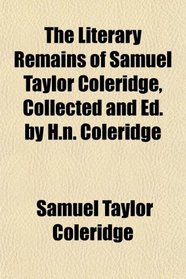Search -
The Literary Remains of Samuel Taylor Coleridge, Collected and Ed. by H.n. Coleridge
The Literary Remains of Samuel Taylor Coleridge Collected and Ed by Hn Coleridge
Author:
General Books publication date: 2009 Original publication date: 1838 Notes: This is a black and white OCR reprint of the original. It has no illustrations and there may be typos or missing text. When you buy the General Books edition of this book you get free trial access to Million-Books.com where you can select from more than a million book... more »
Author:
General Books publication date: 2009 Original publication date: 1838 Notes: This is a black and white OCR reprint of the original. It has no illustrations and there may be typos or missing text. When you buy the General Books edition of this book you get free trial access to Million-Books.com where you can select from more than a million book... more »
ISBN-13: 9781150040634
ISBN-10: 1150040637
Publication Date: 12/18/2009
Pages: 398
Rating: ?
ISBN-10: 1150040637
Publication Date: 12/18/2009
Pages: 398
Rating: ?
0 stars, based on 0 rating




